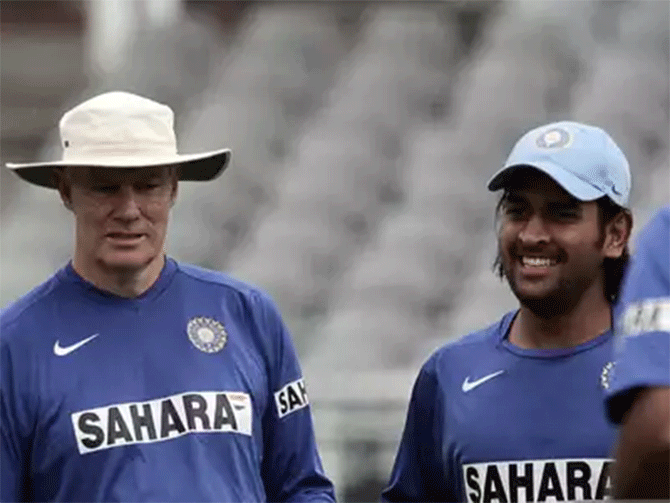 | « Back to article | Print this article |

Australian great Greg Chappell has rated former India captain Mahendra Singh Dhoni as "one of the sharpest cricket minds", saying his decision-making skills set him apart from his great contemporaries.
Chappell, who had a tumultuous two-year tenure as India's chief coach from 2005 to 2007, has often spoken highly of the two-time World Cup-winning captain who ended his glorious career as one of the country's greatest players.
The Australian cited the example of Dhoni while lamenting the absence of natural environments that once played a huge part in the development of players in strong cricket nations.
"The developed cricket countries have lost the natural environments that were a big part of their development structure in bygone eras. In those environments, young cricketers learned from watching good players and then emulating them in pick-up matches with family and friends," Chappell wrote in ESPNcricinfo.
"The Indian subcontinent still has many towns where coaching facilities are rare and youngsters play in streets and on vacant land without the interference of formal coaching. This is where many of their current stars have learned the game."
One of them is Dhoni, who came from the town of Ranchi in Jharkhand.
"MS Dhoni, with whom I worked in India, is a good example of a batter who developed his talent and learned to play in this fashion.
"By competing against more experienced individuals on a variety of surfaces early in his development, Dhoni developed the decision-making and strategic skills that have set him apart from many of his peers. His is one of the sharpest cricket minds I have encountered," Chappell said.
Beginning his career under Sourav Ganguly and John Wright, Dhoni began flourishing in the Rahul Dravid-Greg Chappell era, his explosive knock of 183 not out in an ODI against Sri Lanka being of the highlights.
Former Australia batter Chappell is of the opinion that coaches need to create environments where players can learn problem-solving and decision-making on their own.
Noting England's struggles in the recently-concluded Ashes, Chappell said the problem is with the absence of natural environments for the youngsters to express themselves.
"England, on the other hand, have very few of these natural environments and their players are produced in a narrow band of public schools, with an emphasis on the coaching manual. This is why their batting has lost much of its flair and resilience.
"The games that young people make up and play are dynamic and foster creativity, joy, flexibility in technical execution, tactical understanding and decision-making, which are often missing in batting at the highest levels."
He added, "Invariably, when an adult gets involved with kids playing cricket, they break up the game and kill its energy by emphasising correct technique.
"This reduces a dynamic, engaging environment that promotes learning to a flat and lifeless set of drills that do little to improve batting in games."
Chappell said having highly structured settings is not the right way to go.
"The growth in structured training in the preparation of batters has not only failed to take batting forward, it has actually resulted in a decline in batting. Highly structured environments, and an excessive focus on teaching players to perform "correct" technique, dehumanise cricket."
